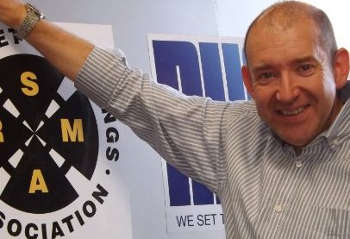As the chief executive of the Road Safety Markings Association (RSMA), George Lee, prepares to move on to take up his new post leading the Highways Term Maintenance Association, the RSMA takes a look back at the last two decades of his leadership and gives us an exclusive look at what comes next.
In an ever changing world, with what seems like an ever increasing range of demands placed on contractors of all sizes by clients who are short of resources, it is easy to forget the immense changes that have taken place in the delivery of specialist contracting services in the highways industry over the last 20 years.
The road marking sector is certainly no exception in the scale and range of change that has taken place and in fact it is a sector that has been in the vanguard of many of those changes, especially in key areas such as skills training and qualifications.

George Lee
Two decades ago the road marking sector faced a major challenge with the imminent introduction of performance contracts, whereby new material standards, defining a range of performance attributes for installed road markings covering retro reflectivity, skid resistance etc, were about to revolutionise the demands on the sector and bring greater accountability to the contracting environment. This change, while a boost for clients, provided a major headache for employers who generally had inconsistent skills training and poorly regulated training standards and accreditation.
‘As a sector we welcomed and feared, in equal measure, the concept of performance contracts for road marking’ says RSMA chairman Paul Aldridge.
‘Welcomed because it provided an opportunity to evidence the importance of road markings to road safety and the efficient use of the highways network, but feared because many of us felt the training and related standards were insufficient to ensure that the sector could effectively, and safely, deliver in a performance environment.’
The realisation that the sector training regime was not robust enough for the demands of the future was, however, only half the problem, according to RSMA chief executive George Lee.
‘Having initially been brought into lead RSMA into the new environment and to promote the use of quality road markings, working with the RSMA Board, we quickly realised that there was more than just a structural issue regarding training.’
The industry training standards promoted an in-house provision model that lacked integrity; however this structure was really a capacity issue more than anything else. In common with the rest of the highways industry at that time, the road marking sector lacked capacity to both define the skills involved and competencies required to consistently deliver.
‘The RSMA has promoted and delivered significant change in the highways industry approach to training over the last 20 years,’ says Mr Lee, ‘however, the most significant change was that of kick-starting specialist NVQ design and delivery.’
In recognising the issues, RSMA quickly engaged with the Construction Industry Training Board (CITB), which was already working on fledgling competency standards for highways provision.
Mr Lee says: ‘Engagement with CITB was crucial; although they didn’t understand our sector, that was a surmountable problem as they certainly understood how to develop competency standards for industry.’
Working with CITB, the RSMA quickly established the competency structure for road marking operatives only to find that there was no real training sector capacity to deliver the new qualifications.
‘The lack of delivery capacity among training companies was a watershed moment for RSMA.’ says Mr Aldridge, ‘and really redefined the RSMA as a standard setter and a service deliverer’.
This situation led the association to take the decision to build its own delivery capacity, initially only for NVQs, but as time progressed into other areas of training.
As part of building a quality approach to the required qualifications for the sector, the new NVQs were quickly made the main qualification requirement within the road marking sector scheme and demand grew steadily as Construction Skills Certification Scheme (CSCS) accreditation for operatives also became an industry standard.
‘The demands of CSCS certainly provided impetus for the sector, especially where there was no “grandfather rights” meaning that all operatives, regardless of their length of service were required to gain a competency qualification,’ reflects Mr Lee. ‘The lack of grandfather rights was a sector decision that accelerated quality delivery by the industry and was a brave and, I think, unique move within the highways arena.’
The implementation of the NVQ system, primarily delivered by RSMA, also provided the next major training initiative within the highways industry with the development and implementation of the sector’s first Specialist Apprenticeship Scheme and an initial attempt to define sector career paths. Association delivery of NVQ meant that for the first time the sector had robust data on the age profile of its workforce and this revealed the older demographic of the workforce and, as Mr Lee explains, a worrying trend.
‘The data we were collating confirmed the trend, and one that many specialist highways sectors are familiar with, that of an ageing workforce. In itself this needn’t be a concern; however road marking can be an immensely physically demanding occupation and the demographic was deemed to present a risk for road marking companies, hence the development of the apprenticeship scheme.’
The RSMA scheme, the largest of its kind in the UK, established a format that has been translated into over 30 other specialist construction sectors, has delivered over 300 apprenticeships over the last 10 years or so and is set to continue to do so for the foreseeable future.

Paul Aldridge
Mr Aldridge asserts: ‘The RSMA skills training scheme is a flagship for highways sector best practice as a scheme it underpins the skills base for the road markings sector and has done an immense amount in securing a career structure for new entrants and ensuring quality outputs for our clients. Just as importantly, it has helped to transform much of the sector’s approach to workforce safety, as it provides a consistent standard that reaches most employers.’
The RSMA is quick to acknowledge that it is not unique in its development of sector training and quality standards; however, it is different in that so many of these initiatives are self-delivered by the trade body.
‘The association never set out to grow a large training delivery operation. However, as the first into so many of the training and development initiatives that we now see as a natural part of our environment, the obvious way to address the lack of market capacity to deliver these initiatives and to also get the standard and pace of implementation we needed, was to self-deliver for the road marking sector,’ says Mr Lee.
The RSMA continues to drive forward with training and development initiatives and has recently completed the implementation of the sectors’ Operative Refresher & Assessment Scheme or ORAS, whereby all qualified operatives have to undertake a skills review and, where appropriate, refresher training every four years.
Paul Aldridge explains: ‘In a high-risk operating environment it is vital that operatives do not suffer skills fade, which could expose them to even more risk, and the sector has moved to mitigate this with a compulsory refresher course and registration scheme for all Level 2 operatives. This is a first within the highways industry and we believe will set a standard that, once again, others will follow.’
It is with this eye to the future that RSMA is reviewing and possibly refocusing its approach to skills provision over the coming months. ‘As an industry we are presented with constant change and the RSMA is no different. However, our focus remains firmly on our member’s needs and over the next few months we will be looking closely at the opportunities to best meet those needs whether that is in training, apprenticeships or in the more “traditional” trade association activities, such as representation,’ concludes Mr Aldridge.
Register now for full access
Register just once to get unrestricted, real-time coverage of the issues and challenges facing UK transport and highways engineers.
Full website content includes the latest news, exclusive commentary from leading industry figures and detailed topical analysis of the highways, transportation, environment and place-shaping sectors.
Use the link below to register your details for full, free access.
Already a registered? Login